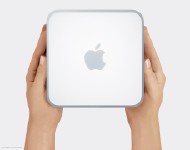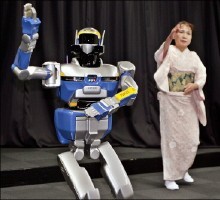
In case you haven't heard,
Steve made a series of product introductions yesterday at
Macworld San Francisco, at least two of which are arguably revolutionary.
The
iPod Shuffle is smaller than a pack of gum, weighs less than four quarters, holds well over 100 (or 200) songs, has a rechargable 12-hour battery, doubles as a USB 2.0 pocket drive, and costs just $99 (or $149). It is shipping now, and will be in stores next week.
The
Mac Mini is a 2" tall, half-foot square Macintosh G4 that weighs less than 3 pounds, and is priced starting at $499 -- $100 cheaper than the high-end iPod Photo, and half the price of a 12" iBook. (It will be available later this month.)
So what does this mean?
Well, for the first time in its history, Apple finally has true entry-level products at highly aggressive consumer price points, which tells me they're making a major assault on market share (emboldened by their success in digital music).
Throughout their entire existence, Apple has been burdened with the reputation that their products are expensive, premium, niche items.
That ended yesterday.
First of all, at $99, the iPod Shuffle becomes an impulse buy. It wouldn't surprise me if Apple sells several times (maybe an order of magnitude) more of these than they have iPods & iPod Minis, which start at $249. (They've sold over 10 million to date, and iPods already account for 65% of the mp3 player market.) Hell, even I'm buying one, and I have absolutely no need for it. (I have an original/vintage 5GB iPod, plus my Treo 600 doubles as an mp3 player thanks to a 512MB SD card.)
Secondly, the $499 Mac Mini is what the ill-fated
PowerMac G4 Cube should have been (it sold for $1799 in 2000). Not only does it make a great second computer -- or entry-level Mac for average consumers from students to seniors -- it is clearly designed and priced so that, as Steve himself said, "people who are thinking of switching [from Windows PCs] have no excuses." The Mac Mini is a (relatively) modest investment that allows PC owners to use their existing peripherals (monitor, keyboard, mouse, etc.), thus significantly lowering the barrier to entry to the Mac platform.
Granted, these two products in and of themselves may not be truly revolutionary -- the iPod shuffle is basically a slick combo flash drive / mp3 player, and the Mac Mini is a monitor-less (and mouse-less and keyboard-less) eMac or iBook -- but what they represent strategically is.
Armed with these two tiny products, Apple is in for a very big year.


















